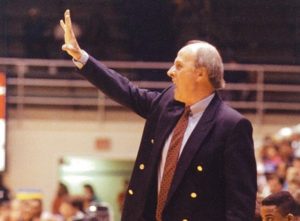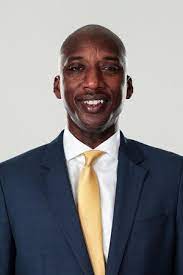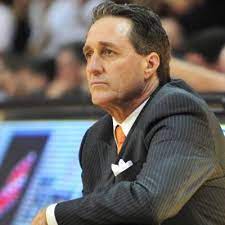Georgia Southern has only made the postseason twice in the past 3 decades but back in the 1980s they were a frequent participant, with 2 NCAA tourneys and 2 NITs during a 7-year span from 1983-1989. Coach Frank Kerns was named 1975 NAIA COY at Spring Hill College before arriving in Statesboro in 1981, and in 1994 he retired with a record of 244-132. HoopsHD’s Jon Teitel got to chat with a pair of Frank’s former players (Charlton Young/Robbie Laing) about all of his accomplishments. Today mark’s the 7th anniversary of Frank’s passing on August 3, 2015, so we take this time to remember his life/legacy.
How did Frank 1st get into coaching? Charlton Young: I have no idea but he coached for a long time. He was a Murray Arnold disciple after they came up together and was an assistant for him at Chattanooga. Everyone is part of a coaching tree and that was his tree. Robbie Laing: He was a high school coach in Mobile to start before becoming an NAIA coach.
In 1982 his Georgia Southern team started 5-10 but won 9 of its last 10 to make the NCAA tourney: how was he able to turn things around, and how was his blood pressure doing after winning 3 straight TAAC tourney games by a total of 5 PTS? CY: As intense as he was, he was a very good in-game tactician. He was never satisfied: he was miserable whether he won or lost! If he had his druthers he would just have his team practice every day and never play any games: he was great at preparation. RL: My 1st year was 1985 but I know that he had a heck of a run before I got there.
In February of 1987 he led Stetson by 5 PTS with 8 seconds left: how on earth did he end up losing the game in OT, and did he get at least a measure of revenge by beating the Hatters in the TAAC tourney title game by 3 PTS? CY: Stetson was a rivalry game but that was a couple of years before I arrived. The league was very good back then and we had a lot of players who slipped through the cracks in college before ending up in the NBA. RL: I was with him for 8 years but that was the 1 year I left for Western Kentucky, although I remember hearing about that game. We played in the tourney right before his game in the Carrier Dome.
In the 1987 NCAA tourney his team shot 55.1 FG% in a 6-PT loss to eventual national runner-up Syracuse: how close did he come to pulling off the upset? CY: They were only a layup away! They had a kid who missed a dunk that would have given them the lead. Frank was known as 1 of the premier guys at coaching the matchup zone defense, and it stifled Syracuse even though they were known for playing defense as well. RL: I watched that game in person. Syracuse is famous for its zone defense but Georgia Southern played zone all night as well. PG Mike Stokes, who is still a friend of mine, was 4-4 from behind the arc, and it went all the way down to the wire.
In 1988 his team led the nation with 56.3 PPG allowed: what is the key to playing great defense? CY: Depending on his personnel he would change some things but he had the matchup zone down pat that allowed him to compete with big-name teams. RL: He was the best at taking what someone else did and then doing it better than anyone else could. That year he studied the Temple matchup zone defense and then took it to another level. He talked constantly with members of the Temple staff and we would have extensively long practices involving playing/talking/calling the Temple staff. He wanted to know exactly what the other team would be doing so we had detailed scouting reports. I remember 1 night where we were preparing for a big game: he had a manager standing by the phone 30 minutes prior to the start of the game just in case it rang. He took the call, got the explanation from a Temple coach…and then went out and executed it!
In the 1988 TAAC tourney title game Texas-San Antonio made all 19 of its FTs in a 7-PT OT win: do you think that Todd Barnes’ foul at the end of regulation occurred before or after the buzzer? CY: I have heard conflicting stories about that but it was a big loss because they expected to get back to the NCAA tourney that year. RL: The bucket was good so we won the game in regulation: it was very unfortunate. I have done this for 34 years: you sometimes forget the great wins but you never forget the painful losses.
He was a 4-time conference COY: what did it mean to him to receive such outstanding honors? CY: Frank was such a workmanlike guy that while I am sure he was proud he was not the kind of guy who cared about stuff like that. He wanted to win games and prepare his guys for life after college. He got a lot of accolades as a coach but I never remember him ever hanging up any awards in his office. RL: He downplayed it because he had a self-deprecating personality…but you could see the inner satisfaction/joy from being recognized at the thing that was driving his life. I sat in the same office as him for 8 years and I got to know his personality/identity. He took great pleasure in that award: I cannot tell you how many times a coach like Wimp Sanderson/Hugh Durham would call him up to ask his advice on how to do something. For a young coach like me at the time it was mind-boggling to see how much respect his fellow coaches had for him.
He resigned in 1994: how hard was it for him to walk away? CY: It was a tough time because there were some issues with the NCAA and I do not think he ever got over that. When something happens at your program you have to take full responsibility. His last trip to the NCAA tourney was in 1992: I was the MVP of our conference tourney that year . We were the #2 offense in the nation with 91 PPG even though Frank had a reputation for being a slow-down coach who would dump the ball inside. We had three 7-footers that year and he called me into his office to say that he wanted to run-and-gun even though he had never done that before. It must have been really hard for him to do that, but it shows that he was smart enough to change with the times. I am sure he was proud of that team because he went outside of his normal personality to do that. It worked in a big way: we went 15-1 in conference play and if I had not dribbled the ball off my leg against Centenary then we probably would have gone undefeated. We played as fast as anyone in the country. Most coaches just do it 1 way but Frank got it done in multiple ways. RL: I had just left for Clemson and knew the guy who took my position. When I heard that Frank resigned I could not believe it because I thought that he would coach until the day he died. He was a simple guy: he coached basketball and then might go play a little golf in the afternoon. For the truly good coaches it is not a job but rather a way of life: it was devastating for him to be without it. We spent a lot of time together after he retired when I was coaching at Campbell. When his health was failing toward the end he would always say nice things about me…but he still remembered the official who I had recommended in the UTSA game! He always said what he perceived the truth to be and never wavered on that. He had a hard time recovering from that and I am not sure that he ever did.
He later worked as a color analyst on radio for the Eagles’ games: how did he like the gig? CY: He loved it! I wound up coaching at my alma mater and he was the color guy while I was there, which allowed us to rekindle our relationship: he treated me like a son. I got to watch how Michael Curry interacted with Frank when I was a freshman, and during my 4 years we grew together and became very close…even though everything was my fault! As a senior it was like the 2 of us were coaching the team together. He came to my press conference when I was introduced as coach, and when he hugged me afterward I told him that it was my program now. He was so happy for me and when they let me go a few years later he was ready to stick up for me. I cherished my time there with him and helped him deal with some of the other guys. He was able to identify guys who would become coaches and tried to groom them for that role. RL: It was something to do to keep him involved, but what he liked most was visiting with the opposing coaches. He got some level of satisfaction from watching the games but was frustrated when his former players/coaches did not do things the way that he had taught us. I remember him getting ejected from a game in the mid-1980s and I had to take over for him. I helped us get back into the game and we had a chance to win, so I felt pretty good about our effort as I headed back to the locker room. He looked at me and said that he felt distraught about a timeout I had called earlier: he took great offense with that. When he latched onto a system he would constantly analyze it and try to perfect it.
When people look back on his career, how do you think that he should be remembered the most? CY: He was a masterful coach who could win whether walking the ball up the court or shooting a bunch of threes. He developed young men and prepared them for life after basketball any way that he needed to: he was before his time. RL: As a master tactician of the game and a man who was passionate about wins/losses as well as getting his guys to understand an unwavering commitment to be successful both on the court and in life. To truly separate yourself from others you need a “labor of love”. Old-school coaches were awfully hard on their guys but afterward guys would understand that very few people could give them such instruction.



